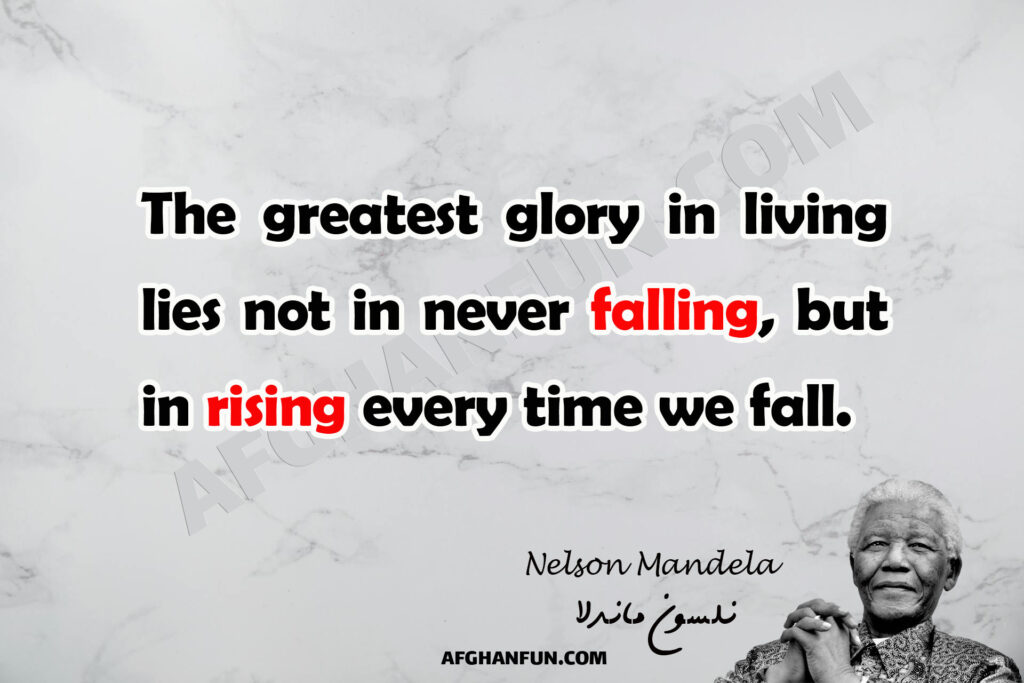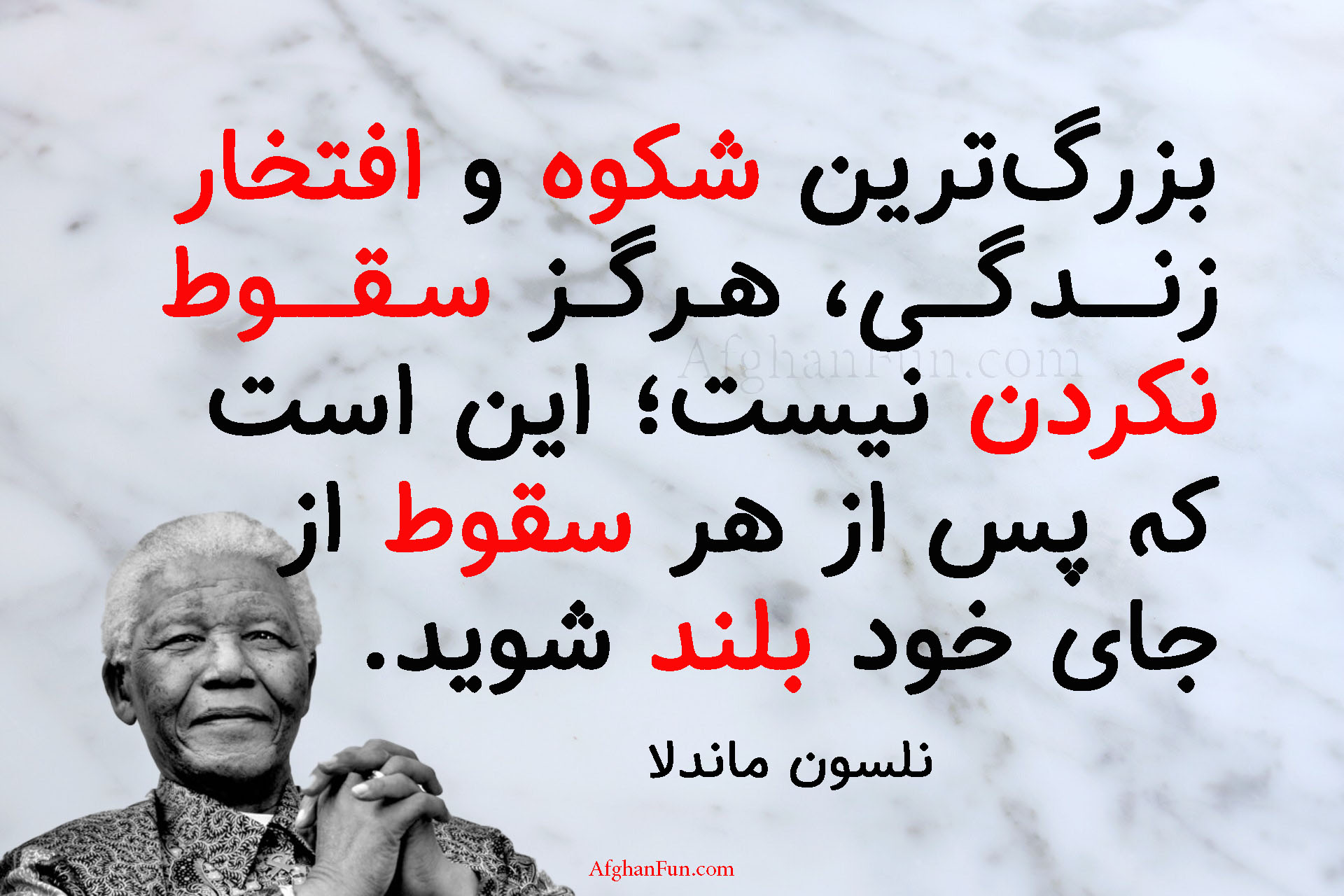
The greatest glory in living lies not in never falling, but in rising every time we fall.
Nelson Mandela
.بزرگترین شکوه و افتخار زندگی، هرگز سقوط نکردن نیست؛ این است که پس از هر سقوط از جای خود بلند شوید
نلسون مانلا
بزرگترین افتخار در زندگی این نیست که هرگز زمین نخوریم، بلکه این است که پس از هر بار زمین خوردن، دوباره برخیزیم و ادامه دهیم. این جمله بیانگر اهمیت مقاومت و پایداری در مواجهه با چالشها و شکستها است. نشان میدهد که شکستها بخشی طبیعی از مسیر موفقیت هستند و مهم این است که تسلیم نشویم.
Бузургтарин шукӯҳу ифтихори зиндагӣ, ҳаргиз суқӯт накардан нест, ӣн аст ки пас аз ҳар суқӯт аз ҷойи худ баланд шавӣд.
Нелсон Мандела
бузургтарин ифтихор дар зиндагӣ ин нест, ки ҳеч гоҳ намеафтем, балки он аст, ки баъд аз ҳар афтидан боз бархезем. Ин сухан таъкид мекунад, ки устуворӣ ва пойдорӣ дар рӯ ба рӯи мушкилот ва нокомӣ хеле муҳим аст. Шикастҳо як қисми табиии роҳи муваффақиятанд ва муҳим он аст, ки таслим нашавем.
أعظم مجد وفخر في الحياة ليس في عدم السقوط، بل في النهوض بعد كل سقوط.
نيلسون مانديلا
أعظم مجد وشرف في الحياة ليس أن لا نسقط أبدًا، بل أن ننهض بعد كل سقوط. هذه العبارة تؤكد أهمية الصمود والمثابرة في مواجهة التحديات والإخفاقات. وتُبرز أن الفشل جزء طبيعي من طريق النجاح، وأن الأهم هو عدم الاستسلام.
Nelson Mandela’s quote, “The greatest glory in living lies not in never falling, but in rising every time we fall,” carries profound wisdom about resilience, human strength, and the nature of success. Here’s a deeper analysis of this quote:
1. Resilience Over Perfection
“The greatest glory in living lies not in never falling” emphasizes that life isn’t about avoiding mistakes or setbacks. Falling—whether it be failure, loss, or adversity—is an inevitable part of life. It’s unrealistic to expect to never face challenges or difficulties. In fact, the notion of always succeeding or never failing is not just impractical but also limiting, as it overlooks the growth that comes through overcoming obstacles.
This part of the quote reminds us that perfection or constant success is not the ultimate goal. Life is messy, full of ups and downs, and that’s part of the human experience. The “glory” is not in avoiding failure but in how we respond to it.
2. The Power of Rising After Falling
“But in rising every time we fall” speaks to the essence of resilience. It suggests that true strength is not measured by how many times you avoid failure, but by your ability to get up, learn, and keep moving forward after each setback. Life’s real victories are in these moments of recovery, persistence, and renewal.
This is where the concept of growth lies. Every time we fall and rise again, we become stronger, wiser, and more capable. The act of rising signifies adaptability, perseverance, and a commitment to continue despite difficulties. It’s through our failures and subsequent comebacks that we achieve growth and deepen our character.
3. Human Experience and Growth
Mandela’s life was a testament to the power of rising after repeated falls. His personal journey, from being imprisoned for 27 years to leading South Africa out of apartheid, is an example of this very principle. Mandela experienced immense hardship, yet he consistently showed resilience in the face of injustice, adversity, and suffering.
The idea that “falling” is not something to be ashamed of, but rather a natural part of growth, is crucial. It encourages a mindset shift: failures are not final or defining; they are temporary and can be stepping stones to success. This philosophy empowers individuals to embrace challenges without fear of failure.
4. A Call to Action
The quote inspires action: it urges us not to be discouraged when we fall but to focus on the courage it takes to rise again. Each fall is an opportunity to learn, improve, and emerge more resilient than before. It suggests that we should view setbacks not as failures but as part of the journey, necessary for personal and professional development.
5. Universal and Timeless Wisdom
This message is universal. It resonates across cultures, professions, and personal experiences. Whether you’re dealing with personal hardship, professional setbacks, or global challenges, the principle of rising after falling is an essential part of the human condition. It offers hope, encouragement, and strength to anyone who faces difficulties, reinforcing the idea that persistence in the face of adversity is the true measure of success.
Conclusion:
Nelson Mandela’s quote is a powerful reminder that setbacks are not a sign of defeat but an opportunity for growth. The true glory in life is not about avoiding failure but about developing the strength and perseverance to rise every time we fall. It’s a message of hope, resilience, and empowerment that encourages individuals to keep moving forward, no matter how many times they stumble.
Nelson Mandela (1918–2013) was a South African anti-apartheid revolutionary, political leader, and philanthropist who served as the president of South Africa from 1994 to 1999. He became the country’s first black head of state and the first elected in a fully representative democratic election. His presidency marked the end of decades of institutionalized racial segregation and the beginning of the nation’s transition to democracy. Mandela is widely celebrated as a global icon for peace, justice, and the fight against oppression.
Here is more information about his life and legacy:
Early Life and Education
- Full Name: Nelson Rolihlahla Mandela
- Birth: July 18, 1918, in the village of Mvezo, in the Eastern Cape province of South Africa.
- Family Background: Mandela was born into the Thembu royal family. His father was a local chief, but he died when Mandela was young, and he was raised by the acting regent, his mother’s family.
- Education: Mandela attended Healdtown (a Methodist school) and later studied at the University of Fort Hare and the University of Witwatersrand. He qualified as a lawyer in 1942, working with Oliver Tambo to establish one of the first black law firms in South Africa.
Political Activism and the Anti-Apartheid Movement
- African National Congress (ANC): Mandela became involved in politics in the 1940s, joining the ANC in 1944. He was influenced by the anti-colonial and anti-racist movements of the time.
- Defiance Campaign: In 1944, he helped launch the ANC Youth League, which advocated for mass resistance against apartheid laws. Mandela became an advocate for non-violent protest, but his views evolved over time as the apartheid system grew more oppressive.
- Rivonia Trial and Imprisonment: In 1962, Mandela was arrested for organizing strikes and sabotage against the apartheid regime. In 1964, he was sentenced to life imprisonment for plotting to overthrow the government during the Rivonia Trial. He was imprisoned for 27 years, mostly at the Robben Island prison.
- During his imprisonment, Mandela became a symbol of the struggle for racial equality, and international campaigns for his release gained momentum. His steadfast commitment to justice and equality inspired people across the globe.
Release from Prison and Presidency
- Release: Mandela was released from prison on February 11, 1990, amid growing internal resistance to apartheid and mounting international pressure on the South African government.
- Negotiations for Peace: After his release, Mandela worked with then-President F.W. de Klerk to negotiate the dismantling of apartheid and transition to a multiracial democracy. The process culminated in the 1994 elections, in which Mandela’s ANC won a landslide victory.
- Presidency (1994-1999): In 1994, Mandela became the first black president of South Africa. His presidency was focused on reconciliation and nation-building, aiming to heal the wounds of apartheid while addressing poverty, inequality, and human rights abuses. He emphasized Ubuntu (the philosophy of shared humanity and interconnectedness) as a guiding principle for a united South Africa.
Post-Presidency and Global Influence
- Retirement from Politics: After serving one term as president, Mandela stepped down in 1999. He continued his activism, especially in the fight against HIV/AIDS, which had a devastating impact on South Africa.
- Global Ambassador for Peace: After his presidency, Mandela worked on various humanitarian causes. He became a global advocate for peace, conflict resolution, and human rights, while continuing his efforts to address issues such as poverty and education.
- Nelson Mandela Foundation: Founded in 1999, the Nelson Mandela Foundation focuses on promoting his legacy of equality, justice, and social change, and it works to address critical social issues in South Africa.
Personal Life and Legacy
- Marriage: Mandela was married three times. His first wife, Evelyn Ntoko Mase, was a nurse, and they had four children. His second wife, Winnie Madikizela-Mandela, was a prominent anti-apartheid activist who faced great personal and political challenges. They separated after 38 years of marriage. His third wife, Graça Machel, was the former first lady of Mozambique.
- Health and Death: Mandela faced numerous health challenges later in life, including a long battle with respiratory infections. He passed away on December 5, 2013, at the age of 95, surrounded by family at his home in Johannesburg.
Mandela’s death was met with an outpouring of tributes from around the world, and his legacy as a leader of peace, justice, and reconciliation is celebrated globally. He was awarded the Nobel Peace Prize in 1993 (shared with F.W. de Klerk) for his efforts to dismantle apartheid and build a democratic South Africa.
Key Contributions and Legacy
- Apartheid Resistance: Mandela is best known for his role in fighting apartheid, an institutionalized system of racial segregation and discrimination in South Africa.
- Peace and Reconciliation: As president, Mandela’s efforts at national reconciliation—through policies like the Truth and Reconciliation Commission—helped prevent civil war and foster national healing.
- International Icon: He is regarded as a global icon for freedom, equality, and social justice. His story has inspired movements for civil rights, equality, and human dignity worldwide.
- Awards: Besides the Nobel Peace Prize, Mandela received numerous awards and honors, including honorary degrees, the Bailie Gifford Prize, and the Presidential Medal of Freedom in the United States.
Famous Quotes by Mandela:
- “Education is the most powerful weapon which you can use to change the world.”
- “I have walked that long road to freedom. I have tried not to falter; I have made missteps along the way. But I have discovered the secret that after climbing a great hill, one only finds that there are many more hills to climb.”
- “It always seems impossible until it’s done.”
Conclusion:
Nelson Mandela’s life was a journey of extraordinary personal sacrifice, resilience, and vision. He spent much of his life fighting against injustice and the oppressive system of apartheid, and his legacy is a testament to the power of forgiveness, reconciliation, and the belief that change is possible, no matter how entrenched the systems of oppression may seem. His life and teachings continue to inspire people around the world to work for justice, equality, and peace.











